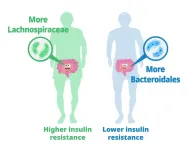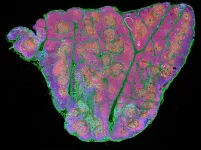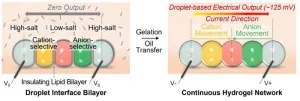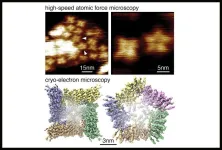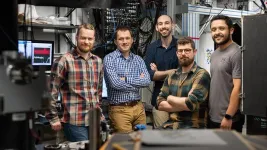(Press-News.org) While self-driving vehicles (SDVs) are being hailed as a solution for safer, more efficient roads, new research suggests British Columbians are not quite ready to embrace self-driving cars wholeheartedly – and will need a period of gradual transition before adoption.
The study, conducted by the Research on Active Transportation Lab (REACT) at the University of British Columbia, reveals mixed perceptions of automated vehicles, particularly their effects on pedestrian comfort and safety.
Do self-driving cars feel safe?
Four out of 10 participants (41 per cent) thought that pedestrians faced reduced safety and comfort levels in SDV interactions compared to conventional human-driven vehicles. In contrast, 34 per cent viewed SDV interactions more favourably, while 25 per cent reported no bias in either direction.
The study engaged 1,133 participants from across B.C. and aimed to assess public sentiment toward self-driving vehicles. Participants watched eight video clips showing interactions between pedestrians and vehicles at crosswalks. Half of the vehicles were labelled as self-driving, while the other half were marked as human-driven. In fact, all the vehicles in the videos were operated by humans, a test design that allowed the researchers to detect biases in perceptions.
Skeptics, optimists and neutrals
“People who harbour anxiety or discomfort regarding new technology were more likely to hold a negative bias against SDVs. Similarly, residents in the Lower Mainland tended to adopt a more critical viewpoint, likely because there are more pedestrians in this urban region,” noted Gurdiljot Gill, a civil engineering PhD candidate who conducted the study.
Opinions also diverged on the broader question of permitting SDVs on public roads. Among those surveyed, 55 per cent voiced support for allowing shared SDVs, such as taxis or shuttles, while 48 per cent backed privately owned SDVs.
However, there was marked consensus around regulation: up to 92 per cent of participants approved of rules such as ensuring driverless cars have identifying marks and requiring a human driver in the driver’s seat, prepared to take control in an emergency.
Participants supported restrictions on SDV use including where driverless cars can operate. Image provided by REACT Lab.
Self-driving car regulation
Given these complex public sentiments, the researchers propose a gradual introduction of SDVs on city streets—starting with a controlled pilot testing phase—to address safety concerns and avoid negative impacts for pedestrians and other travellers.
They also advise running robust public education campaigns to build familiarity and emphasize the potential benefits of self-driving cars, and beginning pilot testing with shared rather than private SDVs.
Other recommendations include requiring that SDVs:
adopt more conservative road behaviour than human-driven cars, particularly in urban settings – such as allowing an additional two to four seconds for pedestrians at crosswalks;
use external communication features to signal their automation to other road users;
have a human in the driver’s seat, to take control in an emergency;
avoid designated pedestrian priority zones, like those around schools
The researchers say the study, funded by transit operator TransLink, is the first to measure perception biases in the population toward SDVs.
“At this critical point in the introduction of automated vehicles, it is essential to understand and consider their effects on everyone who shares city streets – especially pedestrians,” said Dr. Alex Bigazzi, associate professor of civil engineering at UBC and REACT principal investigator.
With ride hailing and SDV testing in other places, industry often determined policy by launching without sufficient system-level planning or controls, he noted.
“A lack of proactive policy in some regions resulted in problems and missed opportunities for integrating new technology in ways that advance system goals such as sustainability, equity and accessibility. We hope this research enables policy-makers to ensure that the introduction of automated vehicles is strategic and directed toward the public good.”
END
Do driverless cars feel safe? New study shows gradual introduction needed to build comfort among all road users
British Columbia is split on safety of self-driving cars
2023-08-30
ELSE PRESS RELEASES FROM THIS DATE:
MD Anderson research highlights for August 30, 2023
2023-08-30
HOUSTON ― The University of Texas MD Anderson Cancer Center’s Research Highlights showcases the latest breakthroughs in cancer care, research and prevention. These advances are made possible through seamless collaboration between MD Anderson’s world-leading clinicians and scientists, bringing discoveries from the lab to the clinic and back.
Recent developments include a novel computational tool to detect single base pair DNA changes in single-cell sequencing data, a potential target to treat hypertension caused by drugs commonly used in organ transplants, further insights into the steps involved in ...
Study finds high blood and urinary metal levels among exclusive marijuana users
2023-08-30
Research conducted at Columbia University Mailman School of Public Health detected significant levels of metals in the blood and urine among marijuana users, concluding that marijuana may be an important and under-recognized source of lead and cadmium exposure. This is among the first studies to report biomarker metal levels among marijuana users and most likely the largest study to date, that links self-reported marijuana use to internal measures of metal exposure, rather than just ...
Bacteria treatment reduces insulin resistance, protects against diabetes
2023-08-30
Researchers led by Hiroshi Ohno at the RIKEN Center for Integrative Medical Sciences (IMS) in Japan have discovered a type of gut bacteria that might help improve insulin resistance, and thus protect against the development of obesity and type-2 diabetes. The study, published August 30 in the scientific journal Nature, involved genetic and metabolic analysis of human fecal microbiomes and then corroborating experiments in obese mice.
Insulin is a hormone released by the pancreas in response to blood sugar. Normally, it helps get the sugar ...
Researchers identify stem cells in the thymus for the first time
2023-08-30
Francis Crick Institute press release
Under strict embargo: 16:00hrs BST 30 August 2023
Peer reviewed
Experimental study
Cells
Researchers identify stem cells in the thymus for the first time
Researchers at the Francis Crick Institute have identified stem cells in the human thymus for the first time. These cells represent a potential new target to understand immune diseases and cancer and how to boost the immune system.
The thymus is a gland located in the front part of the chest, the place where thymocytes (the cells in the thymus) mature into T ...
New ‘droplet battery’ could pave the way for miniature bio-integrated devices
2023-08-30
UNDER EMBARGO UNTIL 16:00 BST / 11:00 ET WEDNESDAY 30 AUGUST 2023
Researchers have developed a miniature battery that could be used to power tiny devices integrated into human tissues.
The design uses an ionic gradient across a chain of droplets – inspired by how electric eels generate electricity.
The device was able to regulate the biological activity of human neurons.
This could open the way to the development of tiny bio-integrated devices, with a range of applications in biology and medicine.
University of Oxford researchers have made a significant step towards realising miniature ...
Study finds how some ion channels form structures permitting drug delivery
2023-08-30
A member of an important class of ion channel proteins can transiently rearrange itself into a larger structure with dramatically altered properties, according to a study led by researchers at Weill Cornell Medicine. The discovery is a significant advance in cell biology, likely solves a long-standing mystery about an unusual feature of some ion channels and has implications for the development of drugs targeting these proteins and for drug delivery.
Ion channels are ubiquitous in the cell membranes of higher organisms. ...
Discoveries on memory mechanisms could unlock new therapies for Alzheimer’s and other brain diseases
2023-08-30
AURORA, Colo. (Aug. 30, 2023) – Scientists at the University of Colorado Anschutz Medical Campus have made a `paradigm shifting’ discovery on the mechanisms required for learning and memory that could lead to new therapies for Alzheimer’s disease and potentially Down syndrome.
The study was published Wednesday in the journal Nature.
For over 30 years, researchers believed that LTP or long-term potentiation, which is crucial for learning and memory, required enzymatic actions by an enzyme known as CaMKII.
But a team of researchers led by Ulli ...
Newly engineered versions of bacterial enzyme reveal how antibiotics could be more potent
2023-08-30
Modern medicine depends on antibiotics to treat infections by disabling targets inside bacterial cells. Once inside these cells, antibiotics bind to certain sites on specific enzyme targets to stop bacterial growth. Randomly occurring changes (mutations) in the genes for these targets occur naturally, in some cases making the target harder for the antibiotic to attach to, and that bacterial version resistant to treatment.
For this reason, the more antibiotics have been used over time, the greater the chances that bacterial populations will evolve to have mutants resistant to existing antibiotics, and the more urgent the call for new approaches ...
World’s coastal wetlands and coral reef islands are hanging by a thread, new study shows
2023-08-30
Coastal wetlands and coral reef islands will struggle to grow fast enough to keep pace with rising sea levels driven by climate change, according to a new study published in Nature. The study was conducted by an international team that includes a Tulane University researcher. The findings show that the future of marshes and other low-lying coastal areas depend heavily on whether global warming can be limited to less than 2 degrees Celsius (3.6 degrees Fahrenheit) as formulated by the Paris Agreement.
A key finding of the paper is that coastal marshes, mangroves, ...
A simpler way to connect quantum computers
2023-08-30
Researchers have a new way to connect quantum devices over long distances, a necessary step toward allowing the technology to play a role in future communications systems.
While today’s classical data signals can get amplified across a city or an ocean, quantum signals cannot. They must be repeated in intervals — that is, stopped, copied and passed on by specialized machines called quantum repeaters. Many experts believe these quantum repeaters will play a key role in future communication networks, allowing enhanced security and enabling connections between remote quantum computers.
The Princeton study, published Aug. ...
LAST 30 PRESS RELEASES:
Don’t Panic: ‘Humanity’s Last Exam’ has begun
A robust new telecom qubit in silicon
Vertebrate paleontology has a numbers problem. Computer vision can help
Reinforced enzyme expression drives high production of durable lactate-based polyester
In Rett syndrome, leaky brain blood vessels traced to microRNA
Scientists sharpen genetic maps to help pinpoint DNA changes that influence human health traits and disease risk
AI, monkey brains, and the virtue of small thinking
Firearm mortality and equitable access to trauma care in Chicago
Worldwide radiation dose in coronary artery disease diagnostic imaging
Heat and pregnancy
Superagers’ brains have a ‘resilience signature,’ and it’s all about neuron growth
New research sheds light on why eczema so often begins in childhood
Small models, big insights into vision
Finding new ways to kill bacteria
An endangered natural pharmacy hidden in coral reefs
The Frontiers of Knowledge Award goes to Charles Manski for incorporating uncertainty into economic research and its application to public policy analysis
Walter Koroshetz joins Dana Foundation as senior advisor
Next-generation CAR-T designs that could transform cancer treatment
As health care goes digital, patients are being left behind
A clinicopathologic analysis of 740 endometrial polyps: risk of premalignant changes and malignancy
Gibson Oncology, NIH to begin Phase 2 trials of LMP744 for treatment of first-time recurrent glioblastoma
Researchers develop a high-efficiency photocatalyst using iron instead of rare metals
Study finds no evidence of persistent tick-borne infection in people who link chronic illness to ticks
New system tracks blockchain money laundering faster and more accurately
In vitro antibacterial activity of crude extracts from Tithonia diversifolia (asteraceae) and Solanum torvum (solanaceae) against selected shigella species
Qiliang (Andy) Ding, PhD, named recipient of the 2026 ACMG Foundation Rising Scholar Trainee Award
Heat-free gas sensing: LED-driven electronic nose technology enhances multi-gas detection
Women more likely to choose wine from female winemakers
E-waste chemicals are appearing in dolphins and porpoises
Researchers warn: opioids aren’t effective for many acute pain conditions
[Press-News.org] Do driverless cars feel safe? New study shows gradual introduction needed to build comfort among all road usersBritish Columbia is split on safety of self-driving cars


